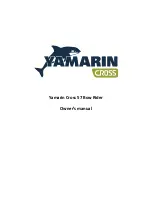
11-2
Section 11
Routine Maintenance
DC235 / DC265
more frequently may indicate a stray current
problem within the boat or at the slip or
marina. Anodes that do not need to be
replaced after one year may not be providing
the proper protection. Loose or low quality
anodes could be the problem. Contact your
dealer for the proper size and type of
anodes to be used and the specific installa-
tion procedure.
Fiberglass Gelcoat Surfaces
Normal maintenance requires only washing
with mild soap and water. A stiff brush can
be used on the nonskid areas. Kerosene or
commercially prepared products will remove
oil and tar which could be a problem on
trailered boats. DO NOT use harsh abrasive
and chemical cleaners because they can
damage or dull the gelcoat, reducing its life
and making it more susceptible to stains.
When the boat is used in saltwater, wash it
thoroughly with soap and water after each
use.
Sudden changes in temperature can affect
gelcoat. When planning on moving your boat
from outdoors to a heated location, allow the
change of temperature to be gradual. Warm
the location slowly after the boat is brought
inside to allow the boat to change tempera-
ture slowly as the location is warmed.
Or, if
you are moving your boat from a warmer
area to a colder one, wait for the tempera-
ture to be closer to the temperature of the
warmer area or allow the warmer area and
the boat to cool down.
At least once a season, wash and wax all
exposed fiberglass surfaces. Use a high
quality automotive or boat wax. Follow the
procedure recommended by the wax manu-
facturer. Washing and waxing of your boat
will have the same beneficial effects as they
have on an automobile finish. The wax will
fill minute scratches and pores which help
prevent soiling and will extend the life of the
gelcoat.
After the boat is exposed to the direct sun-
light for a period of time, the color in the gel-
coat tends to fade, dull or chalk from
oxidation of the gel. This condition will be
more apparent with dark colors, which
require more frequent maintenance. A
heavier buffing is required to bring the gel-
coat back to its original luster. For power
cleaning use a light cleaner. To clean the
boat by hand, use a heavier automotive
cleaner. Before cleaning the surfaces, read
the instructions given with the cleaner. After
cleaning the surfaces, apply wax and polish
all fiberglass surfaces except the nonskid
areas.
If the fiberglass should become damaged
and need repair, contact your dealer for an
authorized repair person to make the
repairs.
Be careful when walking on wet gelcoat sur-
faces.
DO NOT wax nonskid surfaces, these could
make them slippery and increase the possi-
bility of injury.
Stainless Steel Hardware
When using the boat in saltwater, wash
hardware with soap and water after each
use. When your boat is used in a higher cor-
rosive environment, such as saltwater, water
with a higher sulfur content or polluted water,
stainless steel will periodically develop sur-
face rust stains; this is normal under these
conditions.
Clean and protect by using a high quality
boat or automotive wax or a commercial
metal cleaner and protector.
DO NOT use citrus-based, abrasive materi-
als such as sandpaper, bronze wool, or steel
wool on stainless steel as damage will
result.
!
WARNING
SLIPPERY SURFACE HAZARD
Cleaning surfaces can generate slip-
pery conditions which can result in
death or serious injury. Use caution
when cleaning with detergents. Rinse
thoroughly.
Summary of Contents for DC / 265
Page 12: ...8 Operator Notes DC265...
Page 16: ...Operator Notes 12 DC235 DC265...
Page 26: ...Operator Notes 2 6 DC235 DC265...
Page 44: ...6 2 Operator Notes DC235 DC265...
Page 50: ...7 6 Operator Notes DC235 DC265...
Page 84: ...12 6 Operator Notes DC235 DC265...
Page 90: ...Operator Notes A 6 DC235 DC265...
Page 92: ...Appendix B Maintenance Log Date Hours Dealer Service Repairs B 2 DC235 DC265 Maintenance Log...
Page 93: ...Maintenance Log B 3 Appendix B DC235 DC265 Date Hours Dealer Service Repairs...
Page 94: ...Appendix B Maintenance Log Date Hours Dealer Service Repairs B 4 DC235 DC265...
Page 95: ...Boating Accident Report C 1 Appendix C DC235 DC265 Boating Accident Report...
Page 96: ...C 2 Appendix C Boating Accident Report DC235 DC265...
Page 97: ...Float Plan D 1 Appendix D DC235 DC265 Float Plan...
Page 98: ...Operator Notes D 2 DC235 DC265...
Page 102: ...Operator Notes E 4 DC235 DC265...
Page 103: ...Schematics F 1 Appendix F DC235 DC265 Schematics DC235...
Page 104: ...F 2 Appendix F Schematics DC235 DC265...
Page 105: ...Schematics F 3 Appendix F DC235 DC265...
Page 106: ...F 4 Appendix F Schematics DC235 DC265...
Page 107: ...Schematics G 1 Appendix G DC235 DC265 Schematics DC265...
Page 108: ...G 2 Appendix G Schematics DC235 DC265...
Page 109: ...Schematics G 3 Appendix G DC235 DC265...
Page 110: ...G 4 Appendix G Schematics DC235 DC265...
Page 111: ...Schematics G 5 Appendix G DC235 DC265...
Page 112: ...G 6 Appendix G Schematics DC235 DC265...
Page 113: ...Schematics G 7 Appendix G DC235 DC265...
Page 114: ...G 8 Appendix G Schematics DC235 DC265...
Page 115: ...Schematics G 9 Appendix G DC235 DC265...
Page 116: ...G 10 Appendix G Schematics DC235 DC265...
Page 117: ...Schematics G 11 Appendix G DC235 DC265...
Page 118: ...G 12 Appendix G Schematics DC235 DC265...
Page 119: ...Schematics G 13 Appendix G DC235 DC265...
Page 120: ...Operator Notes G 14 DC235 DC265...
Page 121: ......
Page 122: ......
















































